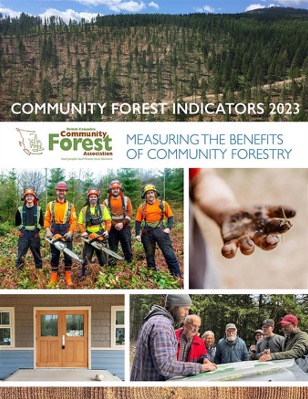
Industry News
News
Forestry Management
Harvesting
BCCFA’s Indicators Report reveals the positive impacts of community forests in B.C.
Community forests measured as leaders in wildfire risk reduction, co-management with First Nations, and representing local values in rural B.C.
September 22, 2023 By BC Community Forest Association

Coinciding with National Forest Week, the BC Community Forest Association (BCCFA) has released its 2023 Indicators Report: Measuring the Benefits of Community Forestry in British Columbia.
In B.C., forest management is undergoing significant changes driven by a provincial shift in forest policy. This includes an increased focus on Indigenous-led initiatives, co-management, and ecosystem health and resiliency. Community forests have long been leaders in implementing
these priorities on the land base, operating as long-term, area-based tenures held by local communities. Representing over 100 rural and Indigenous communities across our province, the BCCFA is a network of community forests that practice ecologically responsible forest management, fostering and supporting healthy and vibrant rural communities and economies.
Since 2014, the many benefits of community forestry have been documented in the BCCFA’s Indicators Report. The 2023 report is based on survey data collected from 35 community forests across the province, utilizing 18 indicators that are analyzed each year to quantify the wide range of positive impacts that community forests provide. This year’s report offers compelling evidence of the value and relevancy of the community forest model.
“The Indicators Report is a testament to how community forests are responding to the key challenges we are facing on the land through collaboration, relationships and innovation. National Forest Week is a great time to recognize and celebrate the significant role community forests are playing in B.C.,” said Randy Spyksma, BCCFA president and manager of the Logan Lake Community Forest.
Community forests have demonstrated their commitment to environmental stewardship and ecosystem resilience, with a focus on wildfire risk reduction activities, all while creating jobs, employing local people in rural areas, and providing over $20 million in community contributions during the reporting period. They have continued to foster long-lasting and trusted relationships with their communities and Indigenous partners. First Nations peoples are deeply involved in many aspects of community forestry as tenure holders, board members, collaborators, and employees of community forest organizations.
Expanding beyond a focus on log sales and timber supply, community forests directly manage for multiple values including recreation, education, and sensitive habitats such as old growth and cultural areas. Over time, community forests have invested over $8 million of their own dollars while managing over $17 million from outside sources to conduct wildfire mitigation activities that support protection of local communities and forests.
“Through their dedication to sustainable practices, community forests have been pioneers in driving positive change within the forestry sector,” said Jennifer Gunter, BCCFA executive director. “Their experiences and successes can serve as valuable examples for the industry as it continues to evolve, and to shape the future of forestry in British Columbia.”
Print this page